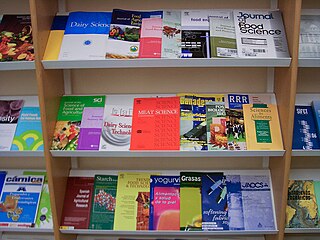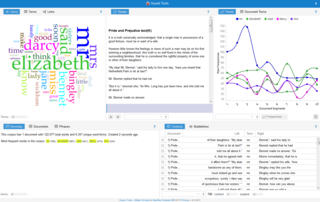
An academic journal or scholarly journal is a periodical publication in which scholarship relating to a particular academic discipline is published. They serve as permanent and transparent forums for the presentation, scrutiny, and discussion of research. They nearly universally require peer review for research articles or other scrutiny from contemporaries competent and established in their respective fields.

The Modern Language Association of America, often referred to as the Modern Language Association (MLA), is widely considered the principal professional association in the United States for scholars of language and literature. The MLA aims to "strengthen the study and teaching of language and literature". The organization includes over 25,000 members in 100 countries, primarily academic scholars, professors, and graduate students who study or teach language and literature, including English, other modern languages, and comparative literature. Although founded in the United States, with offices in New York City, the MLA's membership, concerns, reputation, and influence are international in scope.

Signs: Journal of Women in Culture and Society is a peer-reviewed feminist academic journal. It was established in 1975 by Jean W. Sacks, Head of the Journals Division, with Catharine R. Stimpson as its first editor-in-Chief, and is published quarterly by the University of Chicago Press. Signs publishes essays examining the lives of women, men, and non-binary people around the globe from both historical and contemporary perspectives, as well as theoretical and critical articles addressing processes of gendering, sexualization, and racialization.

The Journal of Asian Studies is the flagship journal of the Association for Asian Studies, publishing peer-reviewed academic scholarship in the field of Asian studies. With an acceptance rate of approximately 6%, it upholds rigorous standards in the evaluation and publication of scholarly research. Each issue of the Journal of Asian Studies circulates over 8,200 copies, reaching a readership across the academic community and beyond.

Digital humanities (DH) is an area of scholarly activity at the intersection of computing or digital technologies and the disciplines of the humanities. It includes the systematic use of digital resources in the humanities, as well as the analysis of their application. DH can be defined as new ways of doing scholarship that involve collaborative, transdisciplinary, and computationally engaged research, teaching, and publishing. It brings digital tools and methods to the study of the humanities with the recognition that the printed word is no longer the main medium for knowledge production and distribution.
Middle East Studies Association is a learned society, and according to its website, "a non-profit association that fosters the study of the Middle East, promotes high standards of scholarship and teaching, and encourages public understanding of the region and its peoples through programs, publications and services that enhance education, further intellectual exchange, recognize professional distinction, and defend academic freedom".

Joseph-Achille Mbembe, known as Achille Mbembe, is a Cameroonian historian, political theorist, and public intellectual who is a research professor in history and politics at the Wits Institute for Social and Economy Research at the University of the Witwatersrand. He is well known for his writings on colonialism and its consequences and is a leading figure in new wave French critical theory.

Boycott, Divestment and Sanctions (BDS) is a nonviolent Palestinian-led movement promoting boycotts, divestments, and economic sanctions against Israel. Its objective is to pressure Israel to meet what the BDS movement describes as Israel's obligations under international law, defined as withdrawal from the occupied territories, removal of the separation barrier in the West Bank, full equality for Arab-Palestinian citizens of Israel, and "respecting, protecting, and promoting the rights of Palestinian refugees to return to their homes and properties". The movement is organized and coordinated by the Palestinian BDS National Committee.

Omar Barghouti is a founding committee member of the Palestinian Campaign for the Academic and Cultural Boycott of Israel (PACBI) and a co-founder of the Boycott, Divestment and Sanctions (BDS) movement. He received the Gandhi Peace Award in 2017.
The Palestinian Campaign for the Academic and Cultural Boycott of Israel (PACBI) was launched in April 2004 by a group of Palestinian academics and intellectuals in Ramallah, in the West Bank. PACBI is part of the Boycott, Divestment and Sanctions (BDS) campaign. The campaign calls for BDS activities against Israel to put international pressure on Israel, in this case against Israeli academic institutions, all of which are said by PACBI to be implicated in the perpetuation of Israeli occupation, in order to achieve BDS goals. The goal of the proposed academic boycotts is to isolate Israel in order to force a change in Israel's policies towards the Palestinians, which proponents argue are discriminatory and oppressive, including oppressing the academic freedom of Palestinians.

Boycotts of Israel are the refusal and calls to refusal of having commercial or social dealings with Israel in order to influence Israel's practices and policies by means of using economic pressure. The specific objective of Israel boycotts varies; the Boycott, Divestment and Sanctions (BDS) movement calls for boycotts of Israel "until it meets its obligations under international law", and the purpose of the Arab League's boycott of Israel was to prevent Arab states and others to contribute to Israel's economy. Israel believes that boycotts against it are antisemitic.
The current campaign for an academic boycott of Israel was launched in April 2004 by the Palestinian Campaign for the Academic and Cultural Boycott of Israel (PACBI) as part of the Boycott, Divestment and Sanctions (BDS) campaign. The campaign calls for BDS activities against Israel to put international pressure on Israel, in this case against Israeli academic institutions, all of which are said by PACBI to be implicated in the perpetuation of Israeli occupation, in order to achieve BDS goals. Since then, proposals for academic boycotts of particular Israeli universities and academics have been made by academics and organisations in Palestine, the United States, the United Kingdom, and other countries. The goal of the proposed academic boycotts is to isolate Israel in order to force a change in Israel's policies towards the Palestinians, which proponents argue are discriminatory and oppressive, including oppressing the academic freedom of Palestinians.
Photography & Culture is a quarterly peer-reviewed academic journal, published by Taylor & Francis. It was founded in 2008 by Val Williams and was initially published triannually by Berg Publishers and then by Bloomsbury Publishing until 2015. Photography & Culture’s editors-in-chief are Erina Duganne, Sarah Parsons, Gil Pasternak, and Yunchang Yang.

Martha Elizabeth Pollack is an American computer scientist who has served as the 14th president of Cornell University since April 2017. Previously, she served as the 14th provost and executive vice president for academic affairs of the University of Michigan from 2013 to 2017.

Reactions to Boycott, Divestment and Sanctions (BDS) refer to the views of international actors on the BDS movement.
With regard to the Arab–Israeli conflict, many supporters of the State of Israel have often advocated or implemented anti-BDS laws, which effectively seek to retaliate against people and organizations engaged in boycotts of Israel-affiliated entities. Most organized boycotts of Israel have been led by Palestinians and other Arabs with support from much of the Muslim world. Since the Second Intifada in particular, these efforts have primarily been coordinated at an international level by the Palestinian-led BDS movement, which seeks to mount as much economic pressure on Israel as possible until the Israeli government allows an independent Palestinian state to be established. Anti-BDS laws are designed to make it difficult for anti-Israel people and organizations to participate in boycotts; anti-BDS legal resolutions are symbolic and non-binding parliamentary condemnations, either of boycotts of Israel or of the BDS movement itself. Generally, such condemnations accuse BDS of closeted antisemitism, charging it with pushing a double standard and lobbying for the de-legitimization of Israeli sovereignty, and are often followed by laws targeting boycotts of Israel.
The American Studies Association (ASA) began an ongoing boycott of Israeli educational institutions in December 2013. The ASA's decision to boycott was controversial because it was the first major American scholarly organization to do so. In April 2016, four ASA members aided by the pro-Israeli Brandeis Center sued the ASA, but the lawsuit was dismissed in 2019 when the judge ruled that plaintiffs lacked standing.

The Jerusalem Declaration on Antisemitism (JDA) is a document meant to outline the bounds of antisemitic speech and conduct, particularly with regard to Zionism, Israel and Palestine. Its creation was motivated by a desire to confront antisemitism and by objections to the IHRA Definition of Antisemitism, which critics have said stifles legitimate criticism of the Israeli government and curbs free speech. The drafting of the declaration was initiated in June 2020 under the auspices of the Van Leer Institute in Jerusalem by eight coordinators, most of whom were university professors. Upon its completion the declaration was signed by about 200 scholars in various fields and released in March 2021.












